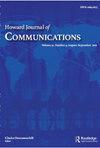反公众和霸权意识形态:对唐纳德·特朗普飓风后在Twitter上对波多黎各的帝国优越感的回应
IF 0.8
Q3 COMMUNICATION
引用次数: 0
摘要
2019年4月,特朗普在推特上批评波多黎各政客接受美国910亿美元援助,称波多黎各从美国拿钱。尽管波多黎各人是美国公民,但他们的政治地位是一系列殖民政策的结果,这些政策确保了美国对波多黎各的重要政治控制。结合2019年3月29日至4月8日期间波多黎各的8256条推文的主题建模和网络分析,我们研究了对特朗普推文的反应,并研究了推文中的话语、争论和反霸权修辞表达。对这些推文的大多数回应都允许创建一个反公共空间,挑战特朗普对波多黎各的描述。然而,这些反应也再现了波多黎各与美国不平等关系核心的未经检验的霸权殖民意识形态。我们认为,由于没有承认界定波多黎各与美国关系的殖民陷阱,即使是反对特朗普言论的反公共话语也无意中加强了殖民关系。本文章由计算机程序翻译,如有差异,请以英文原文为准。
Counterpublics and Hegemonic Ideology: Responses to Donald Trump’s Post-Hurricane Imperial Condescension toward Puerto Rico on Twitter
Abstract In April 2019, Trump criticized Puerto Rican politicians on Twitter for receiving $91 billion in aid from Washington and said Puerto Rico was taking money from the U.S. Even though Puerto Ricans are U.S. citizens, their political status is the result of a series of colonial policies that ensured an important degree of U.S. political control over their island. Combining topic modeling and network analysis of 8,256 tweets on Puerto Rico between March 29 and April 8, 2019, we examine the reactions to Trump’s tweets and study the discourses, contestations, and counter-hegemonic rhetorical articulations that attended the tweets. Most responses to the tweets allowed for the creation of a counterpublic space that challenged Trump’s depiction of Puerto Rico. However, these responses also reproduced the unexamined hegemonic colonial ideology at the heart of Puerto Rico’s unequal relationship with the US. We argue that by failing to acknowledge the colonial entrapment that defines Puerto Rico’s relationship with the United States, even the counterpublic discourses against Trump’s rhetoric unwittingly reinforce the colonial relationship.
求助全文
通过发布文献求助,成功后即可免费获取论文全文。
去求助
来源期刊

Howard Journal of Communications
COMMUNICATION-
CiteScore
2.70
自引率
10.00%
发文量
23
期刊介绍:
Culture, ethnicity, and gender influence multicultural organizations, mass media portrayals, interpersonal interaction, development campaigns, and rhetoric. Dealing with these issues, The Howard Journal of Communications, is a quarterly that examines ethnicity, gender, and culture as domestic and international communication concerns. No other scholarly journal focuses exclusively on cultural issues in communication research. Moreover, few communication journals employ such a wide variety of methodologies. Since issues of multiculturalism, multiethnicity and gender often call forth messages from persons who otherwise would be silenced, traditional methods of inquiry are supplemented by post-positivist inquiry to give voice to those who otherwise might not be heard.
 求助内容:
求助内容: 应助结果提醒方式:
应助结果提醒方式:


